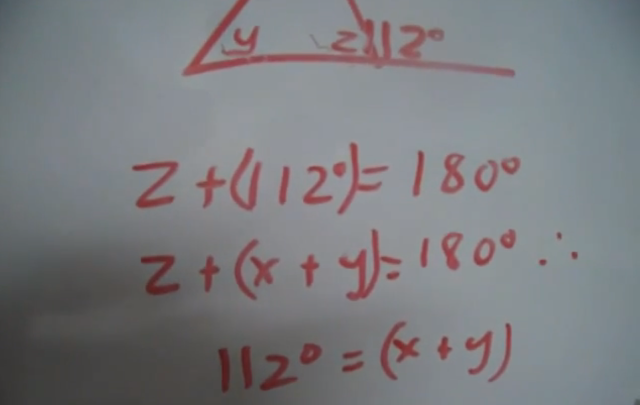Some simple concepts regarding triangles and 180...This student up until quite recently found triangles to be confusing and stupid. But with a little directed discovery and explanation things very rapidly started making sense. Geometry is often easy for visual learners because they can see it...this is not a primarily a visual learner, this is a kinesthetic learner. He is good at sports and the reason he showed up in the first place was because if he got an F they wouldn't let him play.
"If you can count to nine tell me if something is same or different or not and identify a rectangle I can teach you math if you want to learn it...and you need to be able to speak a language preferably English." Is basically how our lessons started and at first he was incredulous. After an hour triangles were EASY. Now we just have to work on the negative associations he has built up over the last two years...he got a D in algebra and hated it. I showed him problem solving and factoring and he was hooked.
Next we will mix in a little algebra...this vid also brings home the fact that knowing your addends by heart makes a BIG difference. Concepts build on concepts and skill sets build on skill sets...soon instead of "2" they will put something like 4x - 20 there. And the student will have to figure out that 4x - 20 = 80. Which is a snap if they understand problem solving concepts but just adds to the confusion if they just got a "D" in algebra and hate it and none of makes sense. Hero Zero and No Fun Get Back To One to the rescue.
In this video a student I am tutoring discovers that the stuff he thought was hard might not be so hard as long as he can count to 180. The angles of triangles always add up to 180 and using a little logic and reasoning we see why the exterior angle and the two non-supplementary angles add up to 180 degrees. I did a lesson already using directed discovery so that he was able to pretty much figure that out for himself he just couldn't elucidate it well so I showed him using some symbols and it really started making sense. (See also vid below.)
You can't see the x but it is the other angle in the triangle.
This student is a little camera shy and as with all students, tends to behave a little bit differently when the camera is on which adds a little pressure. This is another student that was in danger of not being able to play sports because of his math grade and apparently he's pretty good at baseball...and does "ok" in his other classes except, of course, math.
From what I can see he is indeed a kinesthetic learner and once he gets his hands on the blocks a lot of math problems fade away. (Do you see what I did there? I crack myself up.)
 Now we are ready for a "complicated" problem like this on to the left. Looks like it might be tricky but again if you can count to 180 it's not very hard. Turns out it's just two problems stuck together. Suddenly it's pretty easy except for the part that he sees a problem like this and automatically runs a program in his head that this is hard...but then it turns out to be easy and the program is modified. Soon he will be able to understand even poor explanations because he will be running a program called "this is easy I can do this."
Now we are ready for a "complicated" problem like this on to the left. Looks like it might be tricky but again if you can count to 180 it's not very hard. Turns out it's just two problems stuck together. Suddenly it's pretty easy except for the part that he sees a problem like this and automatically runs a program in his head that this is hard...but then it turns out to be easy and the program is modified. Soon he will be able to understand even poor explanations because he will be running a program called "this is easy I can do this."The geometry wasn't making any sense to him nor were the explanations he was getting from his teacher, so he quit paying attention and this turns into a loop that ends with an "F." BTW he tells me probably 90% of his peers are bombing tests and getting poor grades. I'm pretty sure the teacher is just as frustrated if not more than the students.
Anyhow, once he starts understanding basics concepts and the generic ideas all they can do is switch the numbers...and test scores go up dramatically....and people think Crewton Ramone is magic. But it's not magic it's just math....and knowing when to start counting to 180....
Oh and BTW Happy New Year.



No comments:
Post a Comment